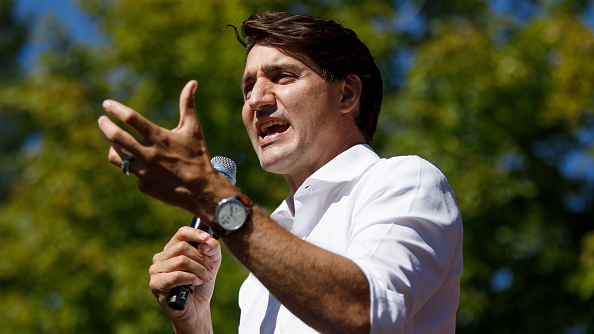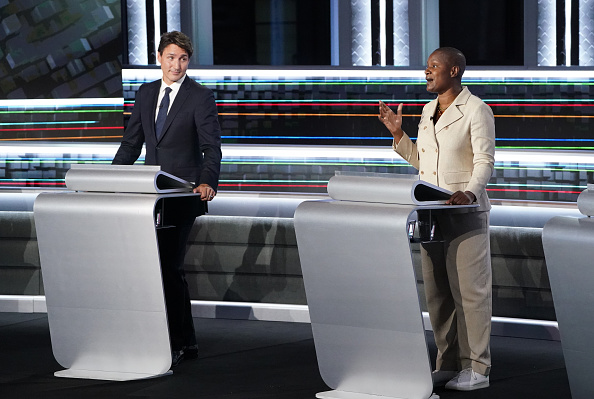
Canada's Liberal Party Leader Justin Trudeau speaks to supporters during a campaign stop in Maple, Canada, September 19, 2021. /Getty
Canada's Liberal Party Leader Justin Trudeau speaks to supporters during a campaign stop in Maple, Canada, September 19, 2021. /Getty
Editor's note: Freddie Reidy is a freelance writer based in London. He studied history and art history at the University of Kent, Canterbury, specializing in Russian history and international politics. The article reflects the author's opinions and not necessarily the views of CGTN.
Polls opened in Canada on September 20 are expected to be a major test for incumbent Prime Minister Justin Trudeau. When the snap election was called, Trudeau was riding high in the polls, but what led the prime minister to roll the electoral dice, and why have the odds narrowed over the course of the campaign?
Trudeau reasoned that his decision to hold a snap election was to give Canadians the opportunity to shape their own post-COVID-19 future. The Liberal leader said, "In this pivotal, consequential moment, who wouldn't want a say? Who wouldn't want a chance to decide where our country goes from here?"
To those in Trudeau's inner circle, it might have seemed an ideal opportunity to capitalize on the positive voter sentiment toward the government's handling of the pandemic. The polls looked promising for Trudeau, and it was a chance to regain the majority the party lost in parliament in 2019. Furthermore, Trudeau's main rival, Conservative leader Erin O'Toole had been in the job for only a year and was little known.
Though what O'Toole lacks in experience, he makes up for in strategy. Aware of his low profile, the Conservative leader successfully articulated the national sentiment by attacking the very premise of the election as the nation entered a fourth coronavirus wave, saying, "Now's not the time for an election. We can wait and go to the polls when it's safe," according to BBC.
Beyond the electoral rationale, another structural flaw was exposed. Even critics would concede that Prime Minister Trudeau's carefully managed personal image is the center of his party's ideological fortunes. The incumbent, therefore, not only staked his personal political future on a snap election but also that of his brand of liberalism – a brand that has been under greater scrutiny than ever before during the campaign. He has drawn criticism over the years from certain quarters, accusing him of being a popinjay for famously sporting garish socks, cultivating a fashionable beard and frequently appearing without a tie in a bid to appear more relatable. Other gimmicks famously include directing a female journalist to use the term "peoplekind" rather than "mankind" during a town hall meeting press conference.
However, during the campaign, Canada's first black party leader Annamie Paul of the Green Party, stated in a televised debate that she did "not believe that Mr Trudeau is a real feminist" because "a feminist doesn't continue to push strong women out of his party when they are just seeking to serve."

Annamie Paul, leader of Canada's Green Party, right, speaks beside Justin Trudeau during a federal leaders' debate in Gatineau, Quebec, Canada, September 8, 2021. /Getty
Annamie Paul, leader of Canada's Green Party, right, speaks beside Justin Trudeau during a federal leaders' debate in Gatineau, Quebec, Canada, September 8, 2021. /Getty
Another politician who exposed Trudeau's prejudice against women was his own former Parliamentary Secretary Celina Caesar-Chavannes, who damagingly told the American-Canadian media Vice that "What I would have wanted was … to leverage or utilize our identity-related expertise, knowledge and experience for the greater good of Canadians and not as a prop or window dressing for your (Trudeau's) campaign hashtags."
While the campaign may indeed have proven unexpectedly damaging for Trudeau, salvation could come in the form of a splintering of the traditional right-wing vote in Canadian politics. In Quebec, a predominantly French-speaking province in Canada, for example, specific Francophone issues have ignited and aided separatist Yves-Francois Blanchet's Bloc Quebecois vote in a way that Vice President Sebastien Dallaire believes "gave a new wind" to Blanchet's campaign, which "may prevent Conservative momentum."
Trudeau is likely to fall short of his desired majority but is likely to remain as leader of a minority government. However, the weaknesses exposed in Trudeau's campaign will likely lead to some major concessions in any future government.
O'Toole, by contrast, may find himself losing the battle but potentially winning the war. He has shifted his party to the center in a short space of time, declaring, "From the first day of my leadership, my priority has been to build a Conservative movement where every Canadian can feel at home … We're not your Dad's Conservative Party anymore."
No longer facing a right-wing Conservative Party out of step with contemporary Canadian thinking but a center-right Conservative Party with a leader who is pro-choice and pro-LGBT rights, Trudeau will need to gamble again on a future direction for his Liberal Party to combat this new force in Canadian politics.
(If you want to contribute and have specific expertise, please contact us at opinions@cgtn.com.)

